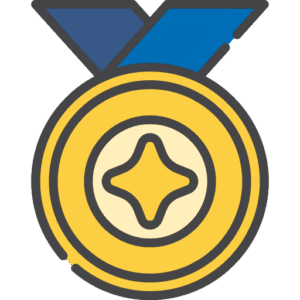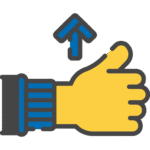The Aim
The primary aim of the model is to help you acquire professional language skills in a more efficient and practical way and in cooperation with language teachers, speciality teachers as well as prospective employers. This means learning not only the language itself but applying it in your field of speciality. With the help of this model, you should be able to:
- Understand and use professional terminology.
- Communicate effectively in professional situations.
- Access and work with professional materials in a foreign language during your studies as well as later at the workplace.
 Your role
Your role
You are the central figure of your own learning journey. Since the model values a learner-centred approach, your active participation and dedication are key to success. The goal is to not only enhance your linguistic competence but to apply professional language skills in real-life professional situations.

Be proactive
in your learning process and actively participate in language and speciality lessons.
Collaborate with:
- your speciality and language teachers at the beginning of the course as well as via discussion-based, constructive feedback sessions throughout and at the end of the course. These sessions provide opportunities for both teachers and students to discuss and co-develop courses, focusing on teaching content and student progress. As a result, courses are tailored to your needs, considering both the topics and your language proficiency level.
- prospective employers via internships, R&D projects, scholarships, advisory board participation, field trips to employer institutions, and career fairs. All of these experiences contribute to seeing the bigger picture.
Make recommendations
regarding the content of the courses, the logical sequence of the courses in the curriculum, and integration of subjects.
Utilise independent study opportunities
such as flipped classroom approach, creating revision activities for material consolidation, introducing new topics, making a presentation on a free topic, for example, related to projects in other subjects.
Bring authentic materials
which you find relevant and think could be employed in the classroom.
Utilise networking opportunities
such as conferences, career days, visits to prospective employer institutions
Share your experiences
for example, when returning from internship – talk to subject teachers, language teachers, heads of training, etc.
Choose the group leader/spokesperson
who takes initiative when cooperating with language teachers, speciality teachers, and prospective employers.
- Reflect on your own progress and ask for feedback.

Language materials
Provided by language teachers – vocabulary lists and tasks to improve all four language skills, i.e. speaking, listening, reading, writing.
Professional materials
Provided by speciality and language teachers, or suggested by you – manuals, technical documents, professional articles, work-related templates etc.
Please note! Materials provided by all stakeholders (including you) include authentic materials.

- Set clear, realistic goals.
- Regularly revise materials, practice professional terminology, and do all the assignments.
- Be proactive – ask questions, request feedback, and participate in discussions.
- Keep in mind that mistakes are part of the process – learn from them!

- Students create exercises on vocabulary revision.
- World cafes to discuss cultural differences (for example, students of Aircraft Piloting, Commercial Aviation Management and Erasmus exchange students discuss cultural differences to learn about their culture from each other).
- Students participate in a job interview role-play, with speciality teachers, the language teacher, and Human Resources specialists acting as interviewers.
- Students provide feedback on the teaching content and the instructor’s respective activities. Students’ expectations and recommendations are considered in improving the content.
- Students already working in the professional field share insights to enhance the course content.
- Students establish their goals for the LSP course based on their language proficiency level.
- Students have an interview with a professional in the field to learn about their career, job and professional network.
- Students have classes in the authentic surroundings (hangar, practice border, simulation classroom, etc).
- Students use authentic databases and materials to improve their language skills.
- Students participate in Cooperative Online Integrated Learning (COIL) activities.
What if Things Don't Go as Expected?
- Discuss your difficulties with your teachers.
- Set smaller, more achievable goals.
- Ask for additional practice opportunities.
- Seek support from other students or professionals.
Gallery
Students of the Estonian Academy of Security Sciences are participating in a joint language and subject exercise.
An illegal border crossing from Russia to Estonia





© All Rights Reserved.

